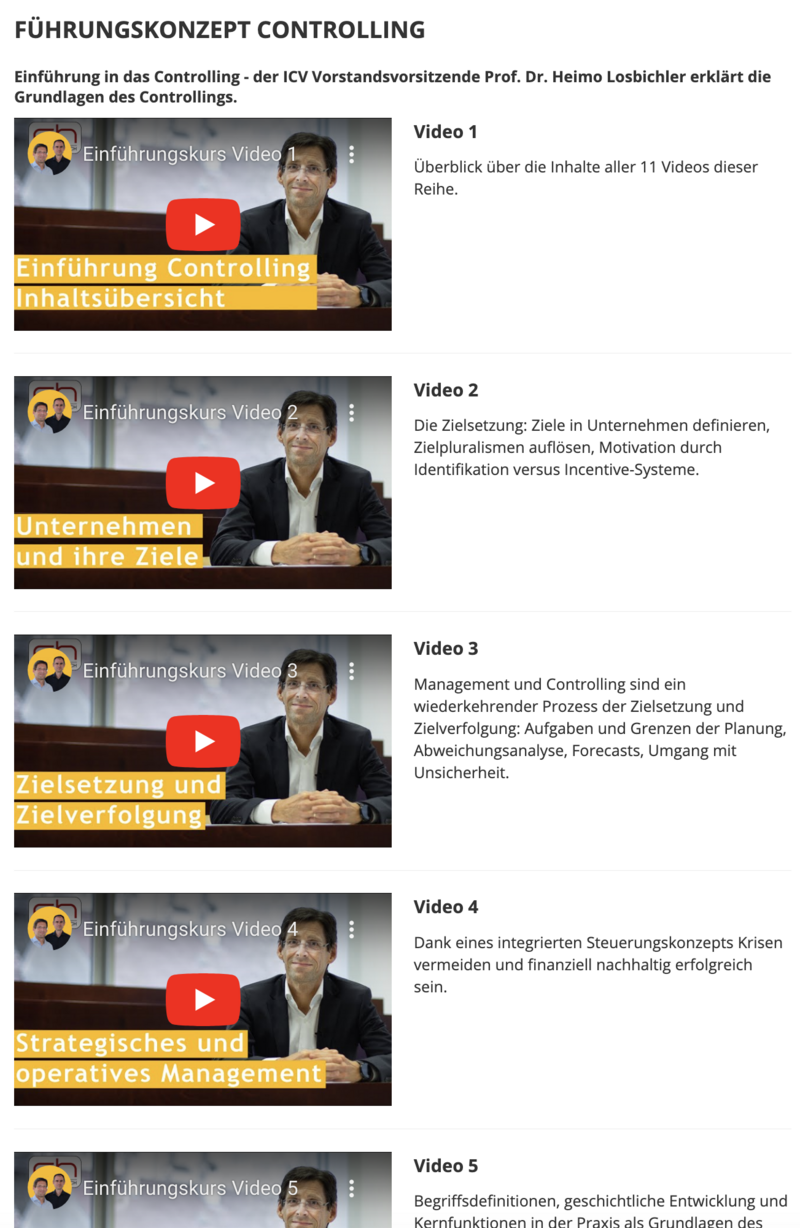What is controlling?
Controlling is...
While accounting with financial accounting includes the activities with external effects, the business accounting covers the internal company transactions. Controlling supplements and expands these two areas by collecting, processing and evaluating their information.
Read also the ICV and the IGC perspective on understanding of controlling and the role of the controller. The perspective is available in 13 languages.
1. Controller and controlling
Controlling generally means comparing the results with standards or benchmarks or regulating something. We understand that controllers develop in accompany the
- management process of defining goals,
- the planning and controlling of business processes
- and thus share responsibility for achieving entrepreneurial goals.
The controller ensures that everyone within the framework of the elaborated goals and plans can control themselves. But the controlling is not operated by the controllers alone. It is done by managers and controllers in the team.
2. On the right way
Corporate planning define three watchwords:
- growth.
- development.
- profit.
3. Controller's job
Controller’s work is methodology and behavior. The methods are accounting and planning and the behavior involves management by objectives. This means that controller’s work requires knowledge of people’s behavior such as the questioning behavior.
What is operative controlling?
Operational or even medium-term controlling of target formation, planning and management refers to a one-year horizon.
Targets include
- liquidity
- profit
- stability
Based on the IGC controller dictionary, International Group of Controlling (Hrsg.)
What is strategic controlling?
To strategic controlling belong
- draft
- exam
- enforcement
- monitoring
of strategies without a limited time horizon. The temporal dimension results from the strategy itself.
Target variables are
- Potential for success (existing / future)
- Market shares (existing / future)
- (Free) cash flow
Based on the IGC controller dictionary, International Group of Controlling (Hrsg.)
How does controlling work?
The data from accounting and cost accounting form the basis for the work of controllers. With the help of their instruments and methods, they process the data generated there, evaluate it and can thus give their partners in the company (management, employees) a far-reaching overview of the company situation. They prepare these reports in fixed periods or as required, e.g.
- Cost-effectiveness calculations as the basis for make-or-buy decisions
- ABC analysis
- Overhead value analysis
- Budget monitoring
- Customer income statement
- Balanced Scorecard
Goals of controlling
The general goal of controlling is to improve operations by providing controllers and controlling with information that makes decision-making at all levels of the organization easier, providing greater transparency. That can be:
- Data on productivity, capacity, labor costs
- Status quo analysis
- Description deviations from the desired
- Description / definition of key figures and contexts (for example, in key account management: time spent looking after the customer in relation to the importance of the customer for the company)
Controlling determines deviations from the plan. Controlling ensures efficiency, e.g. in places where services are provided and costs are incurred. Target agreements and secondary conditions are monitored in coordination with higher-level corporate goals. Controlling and controllers as a higher-level entity thus give those responsible the opportunity to react quickly to developments in order to ensure the achievement of the overall goal.
Which instruments are available in controlling?
Controllers has many tools at their disposal to meet the demanding goals set in controlling. The basis for all tools are the numbers that accounting and cost accounting make available to controllers.
PLANNING
In controlling, a planning system is set up that covers all areas of the company:
- Demand Planning
- Production Planning
- Procurement Planning
- Personnel planning
- Cost Planning
- Operating profit planning
It should be noted that the plans are coupled with each other and thus dependencies arise. As a result, changes to a position often require new planning rounds. For example, planning without a need for change may indicate that there is overcapacity that should be avoided. Several planning systems with different planning horizons are recommended. The closer the planning horizon, the more accurate the forecast must be.
BUDGETING
Its basis is the approved values from the planning. The budgeting assigns them to the areas of responsibility. The budget agreements include the costs and benefits of each cost center. They are regularly monitored for the agreed objectives and deviations are checked and corrected for their causes. The deviation analysis does not only emphasize negative developments. Positive deviations must also be analyzed and evaluated and taken into account by means of alignments of the planned values of the affected divisions.
ACTIVITY BASED COSTING
With its help, the permanent monitoring of the costs of operational processes for the controller is possible. First of all, the overheads are distributed to the processes. Processes can be:
- Order processing
- Purchase processing
- Complaint processing
Repeatable rules are defined in order to regularly examine cost developments and to intervene quickly if necessary.
OTHER IMPORTANT INSTRUMENTS IN CONTROLLING
- Calculation of profitability
- Liquidity planning
- ABC analysis

